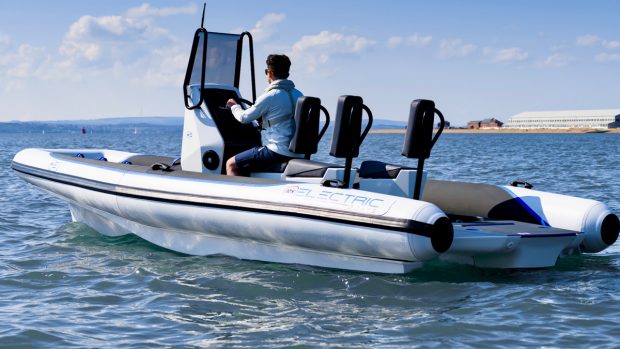Boating might be an escape from the pressures of work and the daily routine, but buying a boat needs to be treated as a business transaction, with the same seriousness as the purchase of a house or a new car.
Buying new
Boating might be an escape from the pressures of work and the daily routine, but buying a boat needs to be treated as a business transaction, with the same seriousness as the purchase of a house or a new car. After all, it will almost certainly be more expensive than your car, and could quite possibly cost more than your house.
Who are you dealing with?
Before getting involved in buying a boat you need to be confident that any company you are dealing with is sound and that any individuals are honest.
Fortunately, given the strength of the motorboating industry in the UK, you are unlikely to run into trouble on either score with any of the many well-established builders or their dealers.
Before committing yourself to buying an imported boat, it is particularly important that you have faith in the importer, as well as being sure that the boat in question is a good one, preferably with a well-established reputation in this country.
If you are not entirely certain about the company you are considering buying a boat from, make some discreet enquiries, perhaps by talking to owners of other boats they have built or local people who have had any other kind of dealings with them. If they are members of the British Marine Industries Federation, as most boatbuilders and dealers are, you could check up on their history. The BMIF wouldn’t give an opinion about them, but could tell you how long they have been in business and could confirm (or otherwise) any other facts you have been given.
Another option is to do a company search. For a small fee, Companies House can provide a report which, although not very detailed, should include an outline of the latest accounts. There are also private organisations from which similar reports can be obtained by post, by fax or on the internet (click here for more details).
Check up also on the builders’ or dealers’ reputation for after-sales service, and on how well geared-up they are to sort out any problems. If you are going to keep the boat overseas, will they be able to do so at all?
Some firms have service centres in the more popular boating areas, or arrangements with local dealers, especially in the western Mediterranean. Others do not.
Got it in writing?
Many, if not most, of the problems that arise between people buying boats and those who are selling them stem from the lack of a clear, written contract between the parties.
The BMIF tell us they receive on average one complaint a day from people relying on verbal agreements which have come to be differently remembered or interpreted by buyer and seller.
If you are buying a boat from stock, the contract need not be very complicated, although it should give details of any deposit being paid, a detailed specification, including any modifications to be made or equipment to be fitted, and a delivery date, subject to any delays resulting from subsequent changes to the specification.
The BMIF have a standard form called ‘Agreement For The Sale Of A Stock Boat’, but it has not been updated for several years and is now rarely used.
In contrast, their ‘Agreement For Construction Of A New Craft’, is widely accepted as the basis for contracts when a boat is ordered to be built. Approved by the Royal Yachting Association, it sets out the price agreed, which should include VAT, and a suggestion of four instalment payments: the first on signing of the agreement, the second on completion of the hull, the third on ‘substantial completion’ of the interior joinery or engine installation, and the fourth after a satisfactory acceptance trial.
Some production boatbuilders and dealers, especially those supplying smaller craft, greatly simplify the instalment payments, to a deposit of 15% to 25% on making the order, with the balance on delivery. Some of the well-established companies may want the balance a week before delivery, but you could still insist on holding back some of the amount until after a trial, and you should certainly not make final payment to lesser-known companies before you take delivery. On larger vessels there is usually at least one interim payment due, for example on the commencement of hull moulding and/or on the installation of the engines.
Although contracts commonly refer to an ‘expected’ date of delivery, penalty clauses are rarely included. If it is crucial that you have your new boat by a certain time, you could try negotiating such a clause; late delivery is another common source of grief in disputes that reach the BMIF.
As with a stock boat, it is important to have a written specification, which should make clear what is included in the price, what are the agreed extras and modifications, with their costs, and when delivery is due.
We have heard of a case in which someone was having a canal boat built at a quoted price of £35,000. He verbally ordered a number of extras, and was shocked to be presented with a final bill for over £55,000. Also, delivery was late, which was a crucial matter for the owner in question; he was intending to live on the boat and had sold his house in readiness to move on board.
Is your money safe?
The BMIF construction agreement includes a clause stating that the boat and the materials and equipment that go into it become the property of the purchaser on payment of the first instalment, whilst the builders have a lien (the right to retain possession) on them until final payment has been made.
It is worth insisting on inclusion of this clause if you are having a fair-sized boat built by one of the smaller or less well-established companies. Should they go bust, you will then have something you can retrieve from their premises rather than just joining the queue of hopeful creditors outside the receiver’s office.
For the same reason, check that all the components of your boat are being marked with a name or hull number as they come into the boatyard. If you are making stage payments, check that each stage of building has really been completed before sending off your cheque. On larger and more expensive boats, it could be worth employing a surveyor to check that work is progressing as claimed, and to a satisfactory standard.
Until the building of your boat has started, and the engine(s) or any equipment have been delivered to the yard, your deposit will not, of course, be protected by an ownership-of-material clause in your contract. For this reason, the amount you put down with your order should be as little as you can get away with. Certainly any demand for more than 30% of the full price should be resisted, and perhaps treated with suspicion.
If you are buying through a dealer, the arrangement might well be different; the dealer could be making stage payments to the builder, backed up by having title on the materials and engines, while asking for parallel stage payments from the buyer that could be protected in some other way, for example by having the money paid into an escrow account (requiring the authority of supplier and customer for any transactions). Some of the largest dealers find that most of their customers trust them with payments without such an arrangement, but they should agree to one if you ask them.
In some cases, usually involving smaller companies, the buyer might have a contract with the builder even if the sale is being handled by a dealer. In this case the dealer is working on commission from the builder, rather than as a principal in the transaction.
Deposits and stage payments can also be protected by a bank guarantee. This arrangement is less rare than it used to be, though it does add to the cost of buying. If you are purchasing a boat through a dealer, the guarantee could well be from the builders’ bank.
If you are buying a boat from stock, you still need to ensure the security of any deposit, and your final payment. Limit the size of the deposit, again to no more than 30% if possible, and if there is going to be some time before final delivery ask for it to be secured in an escrow account or with a bank guarantee. Some dealers have ‘client accounts’ into which deposits are paid, but they might not be what they seem; check out just how much security they offer you.
Several of the above morsels of advice could be be adopted as the morals of the following cautionary tale. A prospective buyer put down an 80% deposit (amounting to about £90,000) on a boat before it had started being built. The builders went into liquidation, and he was told by the receiver that there was nothing in their yard that was identifiably his. He subsequently struck a deal with the new owners of the yard, but effectively lost about £30,000.
What are your rights?
The warranties that many builders and engine manufacturers offer as standard should enable you to have any problems covered by them put right without dispute.
But your rights as a consumer are best protected by law – both national and, increasingly, European.
In the UK, the 1979 Sale Of Goods Act states that anyone who sells something in the course of his business must supply goods of ‘satisfactory quality’ and fit for the purpose for which they are required. Any clause in your contract with builders or dealers, or in a warranty, which seems to exclude or limit this duty should be rendered invalid by the 1977 Unfair Contract Terms Act, or by European Union legislation that outlaws many of the limitations of liability that manufacturers and suppliers have tried to impose.
If your boat is delivered with any ‘material defect’, you have the right to reject it and ask for your money back, or have the defect put right and claim compensation.
To be sure of claiming your rights you need to act as promptly as circumstances permit, especially if you want to reject the boat altogether, so you should take the earliest opportunity to put the boat through its paces. However, you should not lose your rights if, for example, you take delivery of a new boat in winter and faults do not reveal themselves until your first serious outing in early summer.
Do you need lawyers?
Resorting to law can of course be a very expensive business, with the risk that the costs incurred might not be recouped. And that brings us back to the contract you have with the builder or dealer: the more comprehensive it is, the less likely there is to be disagreement.
One thing which could help you save on legal fees should a dispute arise is insisting on the inclusion of the arbitration clause in the ‘Agreement For Construction Of A New Craft’. This allows for the appointment of an arbitrator, jointly chosen by the BMIF and the RYA, to weigh up the arguments of both sides, and either pronounce in favour of one or the other or, as often as not, promote an agreed settlement.
Before entering the full process, which can cost a lot of money, the arbitrator might well suggest a ‘pre-arbitration’ solution. If this is acceptable, it will be considerably cheaper.









